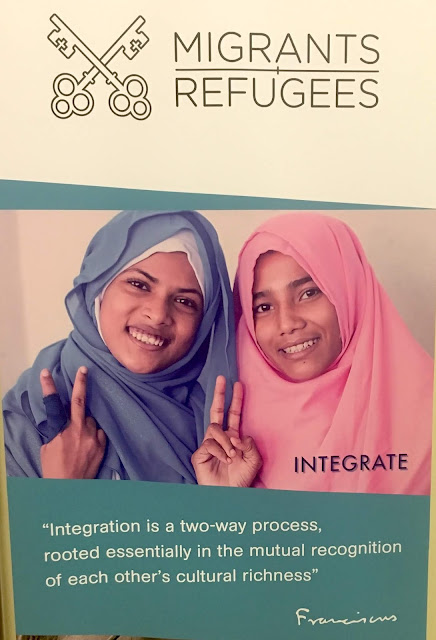 |
| AGI Rome 2019 poster on display at the Migrants & Refugees Section of the Vatican. https://migrants-refugees.va/ |
The Unheard Voices: Refugees With Disabilities
Shana Murray, MNA student
Our AGI Rome program began with speakers from Jesuit Refugee Services. JRS speaker, Cecilia Bock played the voice of a refugee man who shared that without speaking English, he felt as though he had an empty mind and that he only began to feel like a useful person again when he learned English and could speak. We learned throughout our visits that it is critical to hear the stories of the displaced to gain empathy for each other, and not live in fear. I couldn’t help but wonder, how do we hear the stories of those who cannot explain? The stories of those who not only have a language barrier but those who developmentally do not have the communication capacity to tell their experience?
UNHCR International Disability Alliance reported in May 2018 that an estimated 9.3 million persons with disabilities are forcibly displaced as the result of persecution, conflict, violence, and human rights violations. UNHCR International Disability Alliance 2018 These numbers are relevant to demonstrate a need, yet remain stagnant without the compelling and meaningful stories that live beyond it. UNICEF reports that refugees with disabilities are less likely to have had any formal language training in their home countries, with only around 1% of girls with disabilities noted as literate, which compounds the issue. Resource Guide for Serving Refugees with Disabilities My question led me to read on about the stigma of living as a refugee with a disability, the underreported, and the misidentification at registration processes. Reports spoke of the uncollected data and lost profiles of the disabled, and of services that did not recognize the unique needs of the boy that couldn’t sign in his language, let alone ours. Refugees With Disabilities: Disabilities At A Glance But as I read on and learned, I did find hope. The UNHCR report (2018) recognized that an inclusive refugee response must include persons with disabilities and representative organizations. In addition, the U.S. Committee for Refugees and Immigrants (USCRI) resource guide states that the family’s perception and the community perceptions are all important questions that can be evaluated to understand the individual without having to hear from them directly.
It is encouraging to see that there are organizations working to hear the underserved, but the work reaches far beyond the refugee camp. Many people aren’t even aware of the limiting belief systems that keep others feeling like outsiders. Building inclusive communities begins by breaking down our own barriers, by getting to know each other, volunteering, learning each other’s stories. The responsibility lies with each of us to think from an inclusive lens so that our communities are ready to receive people of all abilities. Through our stories, we can see, each of us are simply individuals in need of different supports.
